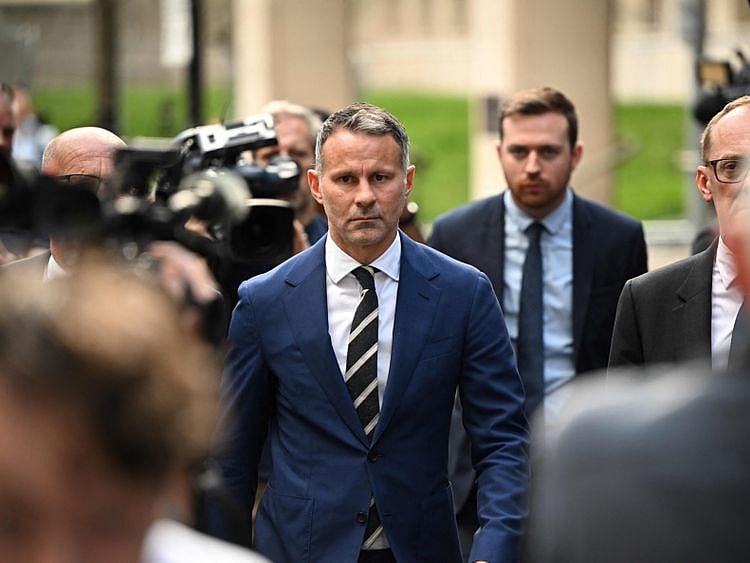Manchester United and Wales icon Ryan Giggs ‘free to rebuild career’ after court battle
Prosecutors withdraw domestic abuse charges, ending a three-year legal battle

Manchester: Ryan Giggs is free to “rebuild his life and career” his lawyer said on Tuesday after prosecutors withdrew domestic abuse charges, ending a three-year legal battle.
Giggs always denied the allegations of controlling and coercive behaviour and assault against his former girlfriend Kate Greville and the assault of her younger sister Emma Greville at his home.
The 49-year-old was due to go on trial for a second time after a month-long trial last year ended without the jury reaching a verdict.
But the prosecution withdrew those charges on Tuesday, acknowledging there was no realistic chance of conviction once Kate Greville had “indicated an unwillingness” to give evidence due to the toll the first trial had taken.
Giggs must now decide whether to re-embark on a coaching career that has been on hold since he was placed on leave by the Football Association of Wales in November 2020.
He had led Wales to qualification for Euro 2020, but missed the tournament as his former assistant Rob Page led the side to the last 16.
Giggs finally resigned from his role in June 2022 after Page masterminded qualification for Wales’ first World Cup in 64 years.
It is for his exploits on the field for Manchester United that Giggs made his name as a dazzling teenage talent who grew into the most-decorated player in English football history.
First glimpse
Former United manager Alex Ferguson recalled his first glimpse of the boy who would play a pivotal role throughout his Old Trafford reign.
“I remember the first time I saw him,” he said. “He was 13 and he floated across the ground like a cocker spaniel chasing a piece of silver paper in the wind.”
Giggs, who was on Manchester City’s books as a youngster, made his league debut for United against Everton in March 1991 at the age of 17.
In his early days the Cardiff-born winger, blessed with explosive pace and silky skills, inevitably drew comparisons with 1960s United star George Best, with his ability to torment opposition defenders.
Off the pitch he became a pin-up and was one of the most marketable players as the glitzy Premier League era began.
He was part of the famous “Class of 92” alongside David Beckham, Paul Scholes, Gary and Phil Neville brothers, but in terms of honours he outdid them all.
The most iconic moment of his career was his winning goal in the 1999 FA Cup semi-final against Arsenal, when he raced from his own half and slalomed through the Arsenal defence before smashing a shot past David Seaman.
Treble winner
That year United went on to complete a historic treble, their greatest achievement during two decades of almost non-stop success under Ferguson.
But there were countless other moments of magic in a career in which he racked up a club-record 963 appearances over 23 years, scoring 168 goals.
In his later years Giggs evolved from being a dashing winger into a creative midfield presence, remaining a key player as he approached 40.
The Welshman, who won a staggering 13 Premier League titles and two Champions League trophies in a trophy-laden career, finally hung up his boots in 2014.
He briefly served as United interim manager at the end of the 2013/14 season, following the ill-fated tenure of David Moyes, and worked for two years as a coach at Old Trafford under Louis van Gaal.
Giggs was never a vocal leader on the field in the mould of some of his Manchester United teammates, and was not considered automatic management material.
When he was appointed as Wales boss he said he was aware that his status as one of the their greatest players was no guarantee he would succeed at the helm of the national team.
But he proved some of the doubters wrong by leading his country to, at the time, just their second major tournament since the 1958 World Cup.
Now he has the chance to prove himself once more if given the chance to kickstart his coaching career.
Sign up for the Daily Briefing
Get the latest news and updates straight to your inbox
Network Links
GN StoreDownload our app
© Al Nisr Publishing LLC 2025. All rights reserved.